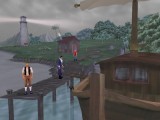Fan games based on more or less commercially viable licenses have always faced the unenviable task of navigating the stormy, abbreviated seas of C&D and DMCA all the while keeping a low enough profile to avoid the aforementioned corporate shallows, at the same time maintaining a public enough face to attract necessary fan interest.
Some projects, like Indiana Jones & The Fountain of Youth and AGDInteractive’s remakes have surprisingly managed to stay afloat; others, like the very latest target of this type of license injustice, The Silver Lining, a King’s Quest fan game, are fish food:
In 2005, Phoenix Online Studios received a Cease & Desist letter from Vivendi Universal, the owners of the King’s Quest IP, in regards to our work on The Silver Lining. We complied with the request, and over the months that followed, we were able to work out a non-commercial fan license with Vivendi that allowed us to continue our work on the game.…
Recently, however, ownership of the Sierra IP changed hands and became the property of Activision. After talks and negotiations in the last few months between ourselves and Activision, they have reached the decision that they are not interested in granting a non-commercial license to The Silver Lining, and have asked that we cease production and take down all related materials on our website.1
The Silver Lining was eight years in the making, and while this final blow in a long uphill battle must be a massive, massive disappointment to the members of the development team, it is also exactly that to the most dedicated fans of Roberta Williams’ classic adventure series; is it not the most interested of fans, after all, that come to develop, find out about and care for these underground fan games?
Obviously, fan games exist in the first place because of existing feelings of let-down: All these fans want is the current IP holder – be it Sierra, Vivendi or Activision – to respectfully commit and contribute to the existing franchise. Should they choose not to, for one reason or another, why should not the fans take the matters in their own hands?
 The most overtly disappointing facet to this situation is the way Activision have chosen to treat a previous, working agreement, a move that comes off as petty, cold and corporate, as the Silver Lining team openly sought to negotiate their relationship with the IP holder with great openness and transparency. In this respect, The Silver Lining should be considered trailblazers of fan/company interaction, and Activision’s decision not to honour the agreement sets a nasty precedent and as such also strengthens the common argument for other fan game developers to stay offline and underground.
The most overtly disappointing facet to this situation is the way Activision have chosen to treat a previous, working agreement, a move that comes off as petty, cold and corporate, as the Silver Lining team openly sought to negotiate their relationship with the IP holder with great openness and transparency. In this respect, The Silver Lining should be considered trailblazers of fan/company interaction, and Activision’s decision not to honour the agreement sets a nasty precedent and as such also strengthens the common argument for other fan game developers to stay offline and underground.
 At the end of the day, it’s not too difficult to see the Pandora’s box –like qualities of granting non-commercial licenses: After all, sooner or later, the amount of interested parties knocking on Activision’s door for “non-commercial fan license” agreements would create an untenable situation for a major company. An astute observer can also obviously point out the dubious legal nature of most fan games, but it feels like a redundant argument in the on-line reality of the now, where video game companies highly value and even base games on user-created content, encourage remixing, support modding, and even offer free engines and SDKs.
At the end of the day, it’s not too difficult to see the Pandora’s box –like qualities of granting non-commercial licenses: After all, sooner or later, the amount of interested parties knocking on Activision’s door for “non-commercial fan license” agreements would create an untenable situation for a major company. An astute observer can also obviously point out the dubious legal nature of most fan games, but it feels like a redundant argument in the on-line reality of the now, where video game companies highly value and even base games on user-created content, encourage remixing, support modding, and even offer free engines and SDKs.
Therefore, by far the easiest way for companies to deal with the issue of the fan game is to simply let fandom work the way it works: Mixing, remixing, reusing and ultimately producing all-new content for the most ardent of fans of various licenses to enjoy.
The internet can be a very slanderous place indeed, but the argument for protecting the integrity of intellectual property in this manner, too, rings hollow as in my experience fan games are proven to be beyond respectful of their source material, often more so than companies themselves, with one minor exception: Some fan games do fall under the umbrella of parody or pastiche, both which are protected by fair use copyright laws in countries all over the world.
Therefore, a fan game takedown feels like a thing of the past, when your IP will take a life of its own online anyway; the question remains, and I think this is really the key here, do you want your reputation to be in the hands of /b/, or your most loyal, respectful fans - like the developers and fans of The Silver Lining? What was to be a joyous occasion is now a wasted opportunity of successful fan/developer interaction, and that is what makes me feel a great sense of loss.
The official website for the game has now disappeared off the Earth, as has the original RC1 demo for the game, but you can still visit a portion of their forums to discuss the matter. A King’s Quest IV-V-VI package was released at GOG.com last week.
- http://www.tsl-game.com/ [↩]








Oh man, such a loss! 8 years of dedicated work. I really hope the crowd will have an effect on Activision somehow and they will change their decision.